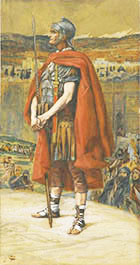Cornelius the Centurion
- JOHN JANARO
Acts 10 gives us the remarkable account of the first Gentile convert to Christianity.
 Prior to this event, the first disciples had been preaching about Jesus only in synagogues and among Israelites. The conversion of Cornelius the centurion (along with all his household) revealed the concrete possibility of bringing the Gospel to all nations.
Prior to this event, the first disciples had been preaching about Jesus only in synagogues and among Israelites. The conversion of Cornelius the centurion (along with all his household) revealed the concrete possibility of bringing the Gospel to all nations.
Cornelius was one of the Gentiles in Palestine who worshiped the God of Israel, though he did not belong to the Mosaic covenant. Such Gentiles had become convinced that the religion of Israel was far superior to the idolatrous practices of their own peoples. Occasionally, they would join the people of Israel through circumcision and adoption of the Law, but usually they remained Gentiles and tried to serve Israel's God as best as they could according to their own status as foreigners among God's people.
As a centurion, Cornelius had a subordinate command (over one hundred soldiers) in a battalion specified as Italica, meaning that they were soldiers from Rome specially assigned to the procurator of Judea, who lived in Rome's administrative capital of Caesarea. Cornelius had a great devotion to God, prayed constantly, and gave alms in abundance for the needs of the Jewish community. We can only speculate as to what circumstances had led him to his convictions. Unlike many of the Roman soldiers in Palestine, he was not a local mercenary hired from among Israel's pagan neighbors (who were raised from childhood to despise the Jews). He came from the corrupt world of pagan Rome and encountered the God of Abraham, Isaac, and Jacob with fresh eyes. For a man of discipline and genuine religious sense, this must have been a profound experience.
We only know that this upright centurion, while praying one day, was instructed by an angel to summon a man called Peter who was staying in Joppa, in order to learn the will of God. Cornelius obeyed without hesitation, sending men down the coast to bring Peter to him. Meanwhile the Lord was teaching Peter, by means of a vision in which Peter was commanded three times to eat animals prohibited by the Law, that what God has made clean you must not regard as profane (Acts 10:15). This prepared Peter to respond to the summons of a Gentile and even enter his house, because God has shown me that I should not call any person profane or unclean (Acts 10:28). Peter began to teach Cornelius and his household about Jesus, and the immediate faith of these Gentiles was such that God poured out the Holy Spirit, in a manner resembling the event of Pentecost, on Cornelius and his household before they received the Sacrament of Baptism. Seeing the gift of the Spirit given to the Gentiles, Peter recognized that they too could (and should) be baptized. They had already been made holy; therefore they had no need to undergo circumcision and the ritual purifications of the Mosaic Law.
This was a pivotal moment in the early days of the Church. The admission of the Gentiles, as Gentiles, into the Church immediately through baptism clarified the whole dynamic of Christianity, freeing it from being thought of as merely a "fulfilled religion of the people of Israel" so that it could be preached as good news for the whole world.
 This is Meaghen Gonzalez, Editor of CERC. I hope you appreciated this piece. We curate these articles especially for believers like you.
This is Meaghen Gonzalez, Editor of CERC. I hope you appreciated this piece. We curate these articles especially for believers like you.
Please show your appreciation by making a $3 donation. CERC is entirely reader supported.

Acknowledgement
 John Janaro "Cornelius the Centurion." Magnificat (February 2021).
John Janaro "Cornelius the Centurion." Magnificat (February 2021).
Reprinted with permission of Magnificat.
The Author

 John Janaro is Associate Professor Emeritus of Theology at Christendom College. He is a Catholic theologian, and a writer, researcher, and lecturer on issues in religion and culture. He is the author of Never Give Up: My Life and God's Mercy and The Created Person and the Mystery of God: The Significance of Religion in Human Life. He is married to Eileen Janaro and has five children.
John Janaro is Associate Professor Emeritus of Theology at Christendom College. He is a Catholic theologian, and a writer, researcher, and lecturer on issues in religion and culture. He is the author of Never Give Up: My Life and God's Mercy and The Created Person and the Mystery of God: The Significance of Religion in Human Life. He is married to Eileen Janaro and has five children.




